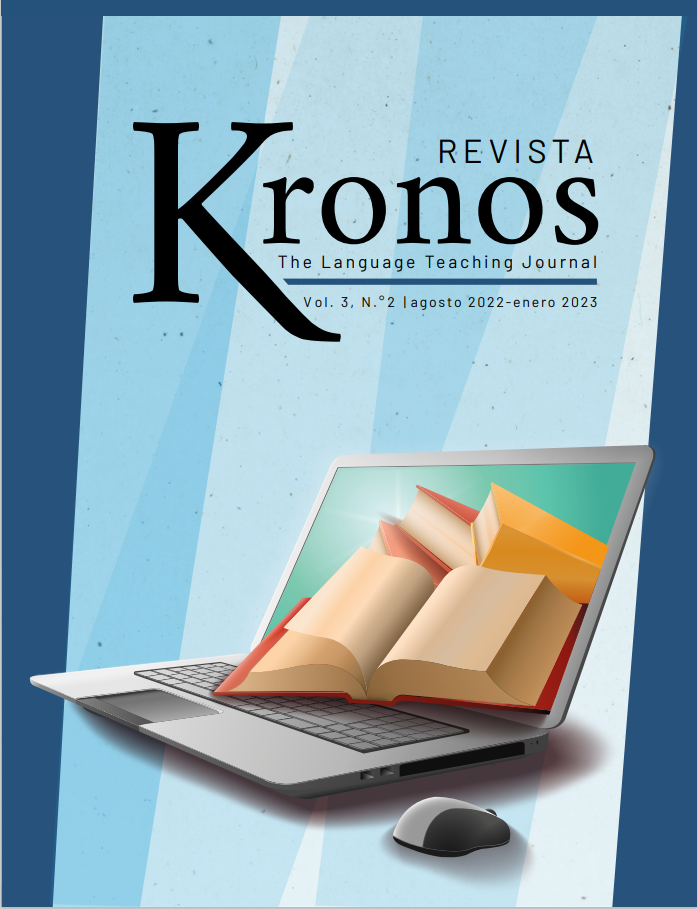The effects of reading for pleasure on efl students’ reading comprehension
DOI:
https://doi.org/10.29166/kronos.v3i2.3954Keywords:
Reading, skills, comprehensionAbstract
This research addresses the development of reading skills in English as a foreign language by strengthening motivational aspects in students with school lag. Reading is the main instrument in the teaching-learning process because it is involved in the cognitive progress of students. The importance of developing reading skills in English is also related to the mother tongue so that it is a complement for comprehensive improvement. It was concluded that the development of reading skills in the population studied, in this case, students of second and third years of baccalaureate at Simon Bolivar high school in Portoviejo City, is low and there are few methodologies applied by teachers that do
not allow reaching the required reading comprehension and through a proposal it is intended to help students acquire new vocabularies and short structures in English, so they will become familiar with reading and then writing, they will also learn to work by playing in groups, and to invent small stories with their own effort. To have significant learning,
the teacher must use the proposed planning; structure it in advance and consider the aspects that contribute to the increase of linguistic intelligen
Downloads
References
Aksu-Koç, A., & Aktan-Erciyes, A. (2018). 16 Narrative Discourse: Developmental Perspectives. In Handbook of communication disorders. Gruyter Mouton, 329-356.
Al Raqqad, Y. M., Ismail, H. H., & Al, K. M. (2019). The impact of reading strategies on EFL students: A research review. International Journal of English, Literature and Social Sciences (IJELS).
Arshad, A., Shakir, A., & Ahmad, M. (2020). A Review on the Principles of a Reading Comprehension Test Construction to assess the Test Takers at different levels. Hamdard Islamicus, 123-138.
Bergin, M. (05 de Marzo de 2015). Chariot Learning. Obtenido de https://www.chariotlearning.com/three-steps-to-better-reading/
Ceyhan, S., & Yıldız, M. (2021). The effect of interactive reading aloud on student reading comprehension, reading motivation and reading fluency. International Electronic Journal of Elementary Education.
Dharmayanti, A. (2020). An Overview of Probing Question Strategy in Promoting Students’ Reading Comprehension. RETAIN.
Indeed Editorial Team. (25 de Febrero de 2020). Indeed . Obtenido de https://www.indeed.com/career-advice/career-development/how-to-improve-reading-skills
Jordan, T. (27 de MAyo de 2020). The New York Times. Obtenido de https://www.nytimes.com/interactive/2020/05/27/burst/6-steps-to-become-a-better-reader.html
Kočiský, T., Schwarz, J., Blunsom, P., Dyer, C., Hermann, K. M., Melis, G., & Grefenstette, E. (2018). The narrativeqa reading comprehension challenge. Transactions of the Association for Computational Linguistics, 317-328.
Kung, F. W. (2019). Teaching second language reading comprehension: the effects of classroom materials and reading strategy use. Innovation in Language Learning and Teaching, 93-104.
Kuşdemir, Y., & Bulut, P. (2018). The relationship between elementary school students’ reading comprehension and reading motivation. Journal of Education and Training Studies.
López, B. (2020). Language and subjectivity (a theoretical-methodological-vital reading of Foucault). Andamios, 61-83.
Nevo, E., Vaknin-Nusbaum, V., Brande, S., & Gambrell, L. (2020). Oral reading fluency, reading motivation and reading comprehension among second graders. Reading and Writing, 1945-1970.
Nikolopoulou, K., Akriotou, D., & Gialamas, V. (2019). Early reading skills in english as a foreign language via ict in greece: early childhood student teachers’ perceptions. Early childhood education journal, 597-606.
Novela, G. T., Asrowi, A., & Widyastono, H. (2022). Student's Reading Literacy: Opportunities and Characteristic for Instructional Media Development. Journal of Education Technology.
Özdemir, E. Ç., & Akyol, H. (2019). The Development of a Reading Comprehension Test. 7(2),. Universal Journal of Educational Research, 563-570.
Pourkalhor, O., & Kohan, N. (2013). Teaching reading comprehension through short stories in advance classes. Asian journal of social sciences & humanities, 52-60.
Rashid, M. H., & Islam, W. H. (2021). DISCUSS THE DIFFERENT TYPES OF READING TECHNIQUES AND DEVELOP ITS SKILLS. JOURNAL OF ENGLISH LANGUAGE AND LITERATURE (JOELL).
Sanir, H., Ozmen, E. R., & Ozer, A. (2022). The mediating effects of reading fluency, comprehension strategies and prior knowledge on the relationship between intrinsic motivation and reading comprehension. Current Psychology, 1-16.
Smith, R., Snow, P., Serry, T., & Hammond, L. (2021). The role of background knowledge in reading comprehension: A critical review. Reading Psychology, 214-240.
Walgermo, B. R., Foldnes, N., Uppstad, P. H., & Solheim, O. J. (2018). Developmental dynamics of early reading skill, literacy interest and readers’ self-concept within the first year of formal schooling. Reading and writing, 1379-1399.
Published
How to Cite
Issue
Section
License
Copyright (c) 2022 Lisbeth Santos Mera, Carlos Chancay

This work is licensed under a Creative Commons Attribution-NonCommercial-ShareAlike 4.0 International License.












